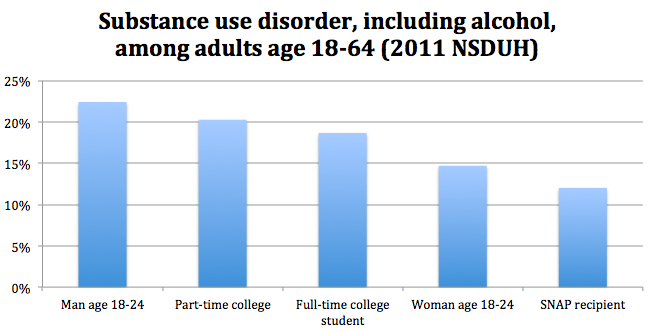House Republicans want to give states the authority to drug-test food stamp applicants. Yet as Sheldon Danziger and I discuss in Wonkblog today, young adults show much higher rates of drug and alcohol disorders than do SNAP recipients.

This suggests that sites such as the one below provide a more target-rich environment for drug-testing than does the SNAP counter at your local social service agency. (I suspect Jonathans Chait and Cohn would agree with me on this one.)

Author: Harold Pollack
Harold Pollack is Helen Ross Professor of Social Service Administration at the University of Chicago. He has served on three expert committees of the National Academies of Science. His recent research appears in such journals as Addiction, Journal of the American Medical Association, and American Journal of Public Health. He writes regularly on HIV prevention, crime and drug policy, health reform, and disability policy for American Prospect, tnr.com, and other news outlets. His essay, "Lessons from an Emergency Room Nightmare" was selected for the collection The Best American Medical Writing, 2009. He recently participated, with zero critical acclaim, in the University of Chicago's annual Latke-Hamentaschen debate.
View all posts by Harold Pollack


You are being funny but the serious one would be to consistently test people on parole and probation.
Well, it depends on the context. If you’re talking HOPE-style programs, yes [1]. But if it were only (as in the context of the Republican proposal) to deny them SNAP benefits, this would likely become an extension of one of the more stupid ideas known to humanity (denying released drug felons welfare benefits, modulo states opting out). Preventing recidivism is a hard problem, but creating an actual incentive for ex-convicts to reoffend is unlikely to make it any easier.
The bigger problem with the Republican proposal is that it’s the last in a long history of ideas of restricting public welfare benefits to the “worthy” and “deserving”, rather than predicating them on actual public policy benefits, as though effective policy making always followed the rules of a morality play.
But I will agree that Harold’s picture was a low blow. 🙂
[1] My agreement being contingent on policy details.
The deserving/undeserving distinction goes back at least to the Elizabethan Poor Law of 1601, with its ¨idle poor¨, who were punished, and ¨impotent poor¨¨ who were to be looked after.
@Katja: I have advocated for HOPE, 24/7 for so long and so many times I forget that it may not be obvious that’s what I mean when I raise these issues, but FWIW here I am making the point at RBC
https://thesamefacts.com/2011/10/drug-policy/the-opportunity-cost-of-drug-testing-welfare-recipients/
I’m sorry, Keith, I didn’t mean to imply that you were thinking that. Obviously, I’m quite aware that you’re very much in favor of HOPE-style programs, and didn’t mean to intimate otherwise. I was trying (inartfully, I’m afraid) to make the point that, regardless of your own preferences, the actual Republican amendment that Harold was talking about also targets people on parole, but in a different way, and that one strikes me as profoundly stupid.
I align myself publicly with the Senator from Scotland and Germany and commend her wise remarks on the stupidity of this particular bill.
Fair enough. But you have a conflict of interest in commenting on this thread….
Surely the case to cite is Florida, where a testing firm coincidentally owned by the governor got the contract to test state aid recipients, to boot users off the dole, and spent millions to save a few thousand dollars.
Rick Scott corrupt?
Say it ain’t so!
Maybe it’s just me, but I don’t see that testing and detection of drug use tracks 1:1 with “substance abuse disorder, including alcohol.” First of all, if you want to detect alcohol, you’ve got to test for that, not drugs. Second, depending on the drug, a smaller or larger percentage of that cohort will have a SAB. Of course, our legal system almost always assumes any positive drug test is a problem. True, it may be a legal problem, but it often does not rise to a SAB. The idea of drug testing in the legal environment is to “get something” on people. Drug testing in a medical environment focuses on the health of the patient and should not be subject to the canard that use=abuse.
I am guessing that their bill doesn’t include drug tests for corporate welfare.
Imagine if the executive suite of every company applying for a government contract had to pee in a cup and breathe into a straw every six month to assure that criminals and impaired people were not taking our tax money…
I did imagine that… and now I have to go change may pants, thank you very much.